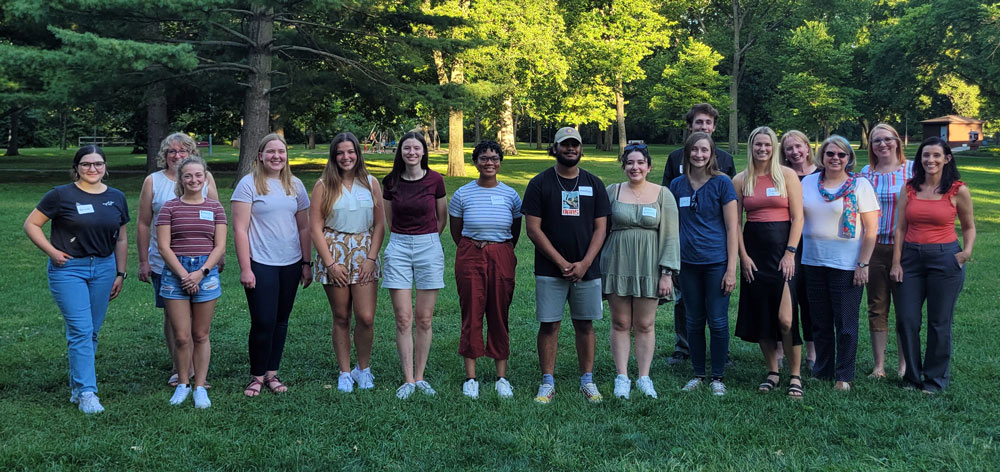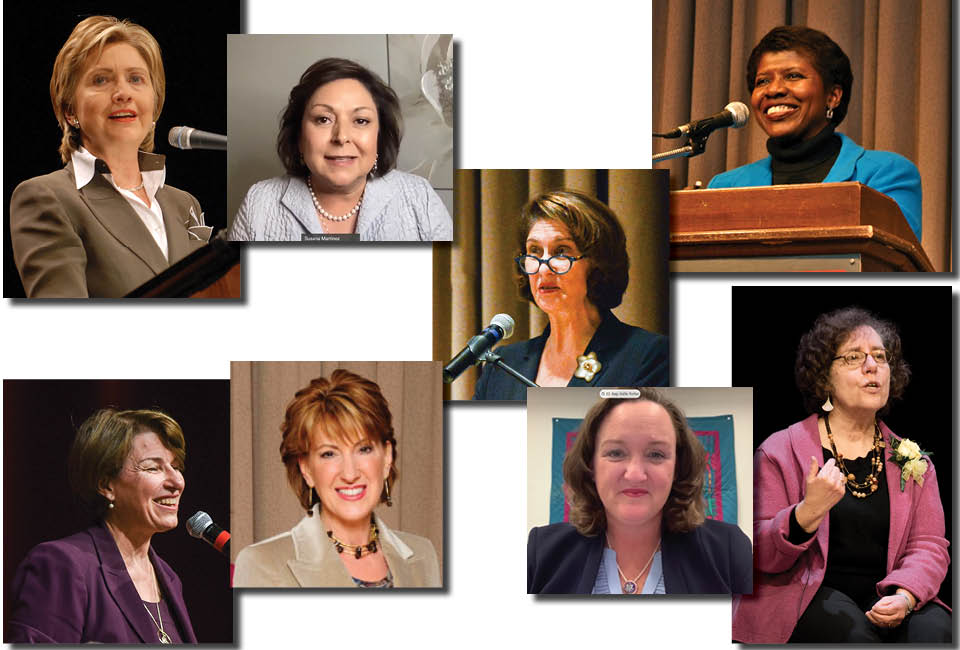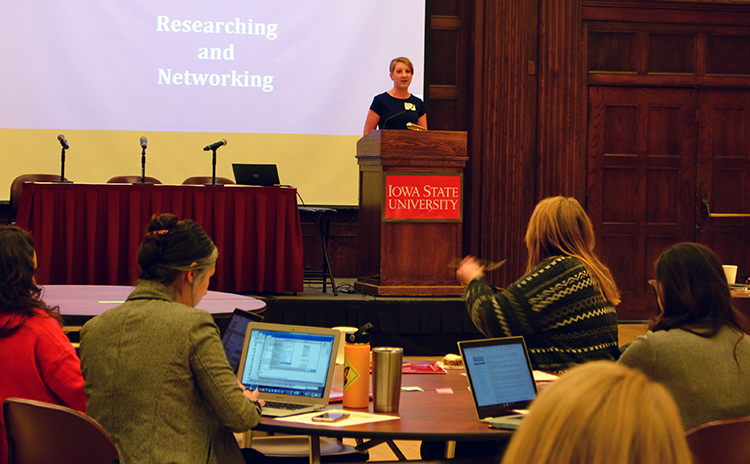By Dianne Bystrom, Ph.D., director emerita
I learned about Carrie Chapman Catt and the history-making impact of her national and international leadership in the 1990s when working on my doctoral dissertation on women’s political communication at the University of Oklahoma.
For my study on the communication styles and strategies of women and men running for the U.S. Senate, I used Karlyn Kohrs Campbell’s “feminine style” as my theoretical framework. Feminine style, which is still used today in research on women’s political communication, is based on Campbell’s rhetorical analysis of the speeches of early women feminist leaders – including Catt – for her two-volume book, “Man Cannot Speak for Her.” In tracing the rhetorical arguments articulated by diverse women leaders in the 72-year-campaign for suffrage, Campbell also analyzed speeches by Elizabeth Cady Stanton, Susan B. Anthony, Sojourner Truth, Dr. Anna Howard Shaw, Ida B. Wells and Mary Church Terrell.
After earning my Ph.D. in communication from OU, I saw an announcement seeking a director for the Carrie Chapman Catt Center for Women and Politics at Iowa State University. I applied, believing it would be an excellent opportunity to combine my administrative experience at OU with my interest in women and politics. An academic center that reflected Catt’s lifelong commitment to expanding participation, leadership opportunities and inclusion in our political process had exciting potential for a university setting and fit well with her alma mater’s land grant mission. Growing up in Nebraska, I also found the possibility of developing this type of center in the Midwest appealing.
My interview dates for the position included February 14, 1996 – the 76th anniversary of the founding of the League of Women Voters under Catt’s leadership as president of the National American Woman Suffrage Association and six months before the anniversary of the ratification of the 19th Amendment to the U.S. Constitution granting women citizens the right to vote in 1920. These were two of Catt’s lifetime crowning achievements, making access to political education and participation a reality for women citizens.
According to the 1920 U.S. Census, the 19th Amendment fully enfranchised, or provided a constitutional guarantee of franchise for, 26 million American women, making it the single largest expansion of voting rights in American history. Also according to the 1920 U.S. Census, some 500,000 African American women lived in states, including Iowa, where they could cast their vote. These states did not have Jim Crow laws that effectively disenfranchised many African American men and women. Today, the national League of Women Voters is led by president Dr. Deborah Turner, an Iowa State graduate and member of the LWV of Nebraska.
As part of my “job talk” during the interview process, I proposed establishing an online archive of women’s political speech at Iowa State as the first resource of its kind. The archive would advance research on women’s political communication as well as the inclusion of more women orators in college and high school speech courses. It also would recognize Catt’s contributions during her 60 years as a public speaker, oftentimes confronting the constraints and sanctions applied to women who were expected to be seen only within the private sphere of the home and have no voice or opinions on political issues.
At the time of my interview, the College of Liberal Arts and Sciences was under the leadership of Dean Elizabeth Hoffman. I embraced her vision for the development of the Catt Center, which was established by the Iowa State Board of Regents in September 1992. I accepted the position, starting my 22-year tenure as director on July 1, 1996.
A shared vision
Our shared goal was to develop the Catt Center into a nationally recognized resource on women and politics, serve Iowa State students interested in leadership and public service, and educate the university community and citizens across the state through outreach focused on gender issues. Building on the programs existing in these areas in 1996, the center grew in innovative, relevant and impactful ways year after year. The program growth opened new learning opportunities that transformed the lives of thousands of students over the past 30 years and increased the visibility of the university on issues of gender equity.
These programs were made possible through the support of numerous donors, who responded to the life and legacy of Catt with generous contributions to the center and its initiatives. During my time as director, I worked with the Iowa State University Foundation and LAS development team to raise more than $4 million in private funds to enhance the center’s research, leadership and outreach programs. (Some of the center’s longtime donors are mentioned in this article. The list of all 2021 donors – which was published in the March issue of the center’s Voices newsletter – can be found here.)
Private funds raised for the center’s programs – both before and during my tenure – were in response to Catt’s key leadership role in securing voting rights for women in the United States as well as her extensive leadership on behalf of international suffrage and world peace. Catt’s life and legacy has continued to resonate with and inspire donors, alumni and people across the state of Iowa, building support for the center and the beautifully restored historic building, Carrie Chapman Catt Hall, in which it is located.
Fostering state, national and international research
The Carrie Chapman Catt Prize for Research on Women and Politics, established by the center in 1994, was the first university-based program to provide cash awards in this area of academic scholarship. With support from Mary Jo and Richard Stanley of Muscatine, the center increased the funds available to recognize and support new research on women and politics. To date, a total of $144,100 has been awarded to 172 researchers from throughout the United States and around the world conducting 133 diverse projects in such areas as political science, history, journalism, communication and women’s studies.
The Stanleys also provided the lead gift to establish the Archives for Women’s Political Communication, which was launched by the center in 2006. It now houses more than 2,800 speeches of 730 contemporary and historically significant women political leaders – including 124 speeches by Catt – as well as more than 2,900 political ads. As envisioned, the archives has become a highly regarded national and international resource for research projects on women’s political communication as well as the teaching of women’s speech in high school and college classes.
The center began documenting the number of Iowa women in elected and appointed office with the initiation of the Women in Iowa Politics Database in 2011 and Gender Balance Project in 2012 to provide additional resources related to gender and politics. The database tracks the status of women in elected office in Iowa at the university, local, state and federal levels. The Gender Balance Project tracks the appointment of women and men to municipal and county boards and commissions in compliance with Iowa law. Both projects provide numerous reports available to the public from the center’s website. A student internship – funded by longtime donors Sharon and Richard Rodine of Dallas, Texas – supports these research initiatives.
Honoring women
The Plaza of Heroines – a mosaic of bricks and granite pavers as well as cement benches – that encircles the entryway to Carrie Chapman Catt Hall was initiated in 1994 as part of the LAS and Iowa State University Foundation’s fundraising campaign theme, HONOR WOMEN. As an extension of the building renovation, it provided a tangible way for Iowa State alumni and friends to honor women who have made an impact on their families, communities and society. The center of the plaza features a large granite paving stone honoring Catt.
Initially administered by LAS, the plaza has been managed by the Catt Center since 2005 as part of its efforts to recognize women’s leadership, achievements and impact. Currently, 4,040 women are honored on the plaza with bricks, pavers and benches in their names. Funds raised through the purchase of bricks, pavers and benches initially supported the renovation of Catt Hall and now contribute to the center’s management and maintenance of the plaza. The plaza has become a destination for brick honorees, donors and their families when they visit campus. The names of all honorees can be viewed on the plaza’s searchable website.
Supporting students
The center has awarded annual scholarships to students through its Legacy of Heroines program since the 1996-1997 academic year. Honoring Catt’s legacy as a heroine for women’s rights and civic engagement, these scholarships are supported by individual donors who serve as mentors to the students selected. With the support of longtime and new donors, the Catt Center has increased the number of Legacy of Heroines scholarships awarded annually. Dr. Hoffman and her husband, Brian Binger, launched the program at the building dedication in 1995 and were among the first donors to the program. Sharon Haselhoff of Larchwood, one of the first Legacy of Heroines scholars in 1996-1998, now gives back to the program with two new scholarships and contributes to the scholarship she received while a student.
Building and recognizing leaders
With the support of longtime donors Joni and John Axel of Muscatine, the Catt Center started offering three undergraduate leadership courses through the Axel Leadership Development Series in 2002. These leadership courses formed the basis of a proposal to establish an interdisciplinary undergraduate leadership certificate program, approved by the university in 2008, and a leadership minor, approved in 2014.
The Leadership Studies Program, which I directed in addition to the center from 2008 to 2018, led to two major gifts in 2015. That year, the Vermeer Corp. of Pella awarded a major gift to establish the Vermeer International Leadership Program that supported a select cohort of undergraduate students with scholarships and international travel for five academic years. In addition, the Stanleys established the Stanley Global Leaders fund to provide annual scholarships for ISU students participating in study abroad programs. In supporting this and other programs at the Catt Center, the Stanleys had a special interest in initiatives that advanced knowledge about women and politics as well as students’ international experiences based on Catt’s leadership in these areas.
The center also recognizes women’s leadership on campus through its annual Women Impacting ISU calendar. Initiated at the suggestion of students affiliated with the center, the calendar was first published in 2007. From 2007 to 2022, 180 women (12 each year) faculty, staff and students have been recognized for their positive impact on Iowa State.
Learning from national leaders, training Iowa leaders
The Mary Louise Smith Chair in Women and Politics was established in 1995 to bring nationally renowned women political leaders, scholars and activists to the Iowa State campus. Founding donors to this program – which honors Iowa native and longtime political and civic leader Mary Louise Smith, the first woman to chair the Republican National Committee – include the Axels and Rodines, with the Stanleys later providing a significant gift. Since the first lecture in fall 1996, 34 women elected officials, journalists and scholars – including eventual presidential candidates Elizabeth Dole, Hillary Clinton, Carol Moseley Braun, Carly Fiorina and Amy Klobuchar, and Pat Schroeder, whose presidential campaign campaign occurred before her visit to Iowa State – have visited campus as the recipient of the chair.
The Catt Center was one of the first organizations invited to participate in the Ready to Run©: Campaign Training for Women program initiated by the Center for American Women and Politics at Rutgers University. The Catt Center has offered Ready to Run® Iowa – which is open to both women and men – every other year since 2007 with the support of donations from individuals and community organizations. During the past 15 years, more than 500 women and men – including a record 172 people in 2017 – have participated in the program.
Achievements and impact
As I reflect on my 22 years as director of the Catt Center since retiring in August 2018, I am proud of what our small team – never more than three full-time staff members and student interns supported by grants and private funds – was able to accomplish. I appreciate that my tenure as director of the Catt Center began with the first woman dean of LAS, Dr. Hoffman, and ended during the tenure of the second woman and current LAS dean, Dr. Beate Schmittmann. Both women supported the center as well as me personally, and I have benefited from their leadership and continuing friendship.
In my retirement, I enjoy observing the continued development of the center under the leadership of director Dr. Karen M. Kedrowski. Over the past 3½ years, the staff has increased the center’s civic engagement initiatives, winning awards for student voter participation in the Big XII and Iowa challenges. Through the work of the center, ISU became the first college in Iowa to receive the Voter Friendly Campus designation in 2020.
Also in 2020, working with a statewide committee, Catt Center staff executed a successful daylong program commemorating the 100th anniversary of the 19th Amendment on February 14. They collaborated with the Iowa Department of Human Rights on the Status of Women and Central Iowa Community Museum to create a traveling exhibit, “Toward a Universal Suffrage: African American Women in Iowa and the Vote for All,” to recognize and celebrate the diversity of the movement. With the support of a grant from the 19th Amendment Centennial Commemoration Committee, they are developing a high school curriculum on the history of the Equal Rights Amendment in advance of the 2023 centennial of its first introduction to Congress.
Celebrating a milestone, advancing a legacy
In September 2022, the Carrie Chapman Catt Center celebrates its 30th anniversary as the second oldest university-based center for women and politics in the United States. This milestone has been achieved through the leadership, commitment and dedication of the alumni who proposed and helped lead the initial fundraising drive; those who have continued to financially support its programs over the years; the staff, students and faculty who have worked at the center; and the administrators and other campus collaborators who have supported its efforts. They have worked together to honor the legacy of Carrie Chapman Catt – one of the most historically significant graduates of Iowa State – and her lifetime of achievements supporting women’s rights in the United States and around the world.
Editor’s note: Dianne Bystrom is currently director of communications for the League of Women Voters of Nebraska and a member of the Humanities Nebraska Speakers Bureau on the topic of women’s suffrage. She has contributed to 26 books, most recently serving as co-editor of “Democracy Disrupted: Communication in the Volatile 2020 Presidential Election,” and has authored several journal articles.